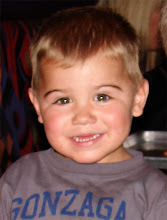I so wish eating carrots and apples were all it took to keep your special heart healthy, buddy.
I wish you didn't have to take medicine every day and I wish you didn't have to have another heart surgery, but I continue to hold out so much hope for your future. There are people out there like Dr. Martin Bocks, a pediatric cardiologist from the University of Michigan, people who are giving us heart moms and dads hope.
Dr. Bocks is leading a team of researchers and scientists to develop a battery-free, miniature cardiac implant that will improve care for kids exactly like Luke. Every six months, Luke undergoes a series of tests at his cardiology appointment (EKG, oxygen saturation level check, blood pressure, weight and height, and echocardiogram). All of these together give his doctor a good idea of how his little heart is doing. But there is some information that can only be gathered by more invasive procedures, such as a cardiac catheterization. Luke has had two of these in the hospital, one before his second heart surgery to gather information about his heart pressures and function, and another to balloon open his aorta, which had narrowed, making his heart have to work harder than necessary. Catheterization procedures are done under general anesthesia and typically include a full day, sometimes a night, in the hospital.
This implant device, shaped a bit like a mushroom, is only 2 or 3 millimeters wide but can give cardiologists powerful information in real-world scenarios. The information in a cath lab is good, but it's obviously a very artificial environment, with the kids under anesthesia. With this pressure sensor device implanted, doctors will be able to read blood pressure levels within a heart chamber as the kids are at rest or at play while they are in the clinic.
If your child has ever been under anesthesia, you know how big this is!
Dr. Bocks says this about the device (which he hopes to see in market by 2013):
“We expect the device to decrease the number of heart catheterizations, help doctors better monitor the effects of medications, and provide early detection for conditions such as blood clots in lungs.”In an interview with the Holland Sentinel, Dr. Bocks explains how this device could be used to benefit heart kids:
“We also hope that it will help us conduct more research,” he adds. “We’ll be able to obtain information from patients when they are sleeping, or exercising – information we had not been able to get to before.”
"What will this cardiac implant allow you to do now with your patients?It's National Heart Month. Let's all keep eating our apples and carrots and supporting those like Dr. Bocks who are bringing hope to heart kids!
The patient comes in and they’re not doing well, their activity level is low; they can’t do much without getting short of breath. Let’s say you want to start a new medication on this patient. Now what you can do is start a medication and follow the pressure in the heart chamber much better. Now we have the opportunity to say ‘OK, he started medicine let’s see daily for a month what happens.’"











I treasure Lukey's heart book. It is precious and shows how creative he is at five. How beautiful that he sees his heart as exactly like all the other kids. What hope the new technologies bring for Luke. I sure love this boy, with all my heart.
ReplyDelete